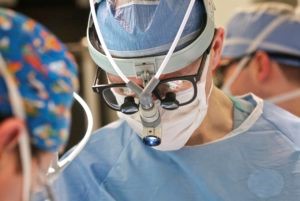
The Division of Otolaryngology-Head and Neck Surgery at Brigham and Women’s Hospital offers expert, individualized care for a range of conditions affecting the ear, nose and throat. Since 2017, Ravindra Uppaluri, MD, PhD, has served as the division chief for the group’s multidisciplinary faculty and staff.
Dr. Uppaluri recently reflected on how the division has grown in recent years in line with its three-pronged commitment to clinical excellence, outstanding research, and teaching and faculty development. He also commented on how the team has provided safe patient experiences during COVID-19.
Expanding Subspecialty Programs
According to Dr. Uppaluri, the Brigham has focused on building key subspecialty programs within the Otolaryngology Division, including head and neck surgery, otology/neurotology, laryngology rhinology and voice/swallowing disorders. He pointed to the division’s collaboration with Dana-Farber/Brigham and Women’s Cancer Center (DF/BWCC) as a prime example of the advanced care it delivers for head and neck cancer patients.
“DF/BWCC is one of the nation’s top cancer centers,” he said. “Within our multidisciplinary group, our head and neck surgeons provide the full spectrum of surgical care, including innovative transoral robotic surgery, virtual surgical planning for mandibular reconstructions and deintensification surgical-based clinical trials for HPV-positive head and neck cancers.”
The division has expanded the head and neck surgery group by adding a pair of new surgeons over the past two years: Eleni M. Rettig, MD, and Rosh K.V. Sethi, MD.
“Both have exceptional training and bring innovative surgical approaches and thinking toward improving outcomes for head and neck cancer patients,” Dr. Uppaluri said. “Their expertise is highly complementary to the skillsets of our other head and neck surgeons, Dr. Laura Ann Goguen, Dr. Donald Annino and me.”
According to Dr. Uppaluri, the Otolaryngology Division is closely collaborating with colleagues in allergy and immunology at the Brigham to provide multidisciplinary care for inflammatory sinus disease and is currently expanding this program.
Sleep and voice programs are also a priority within the division. “Dr. Anthony Prince is working with the Brigham’s Sleep Medicine Program to offer the Inspire hypoglossal nerve stimulator for obstructive sleep apnea,” he said. “In addition, we’re expanding our Voice Program by adding new faculty under the leadership of Dr. Thomas Carroll, who developed a novel, off-the-shelf vocal cord augmentation system.”
An Active Research Enterprise
The DF/BWCC head and neck cancer multidisciplinary group is one of the national leaders in groundbreaking research, especially in the clinical trials arena. “Our surgeons are key players in innovative neoadjuvant immunotherapy trials prior to cancer surgery,” Dr. Uppaluri said. “And, importantly, one of these trials has led to an ongoing international phase 3 trial introducing immunotherapy into the surgical setting. Other examples of active research within the Head and Neck Division include novel window-of-opportunity trials for recurrent head and neck cancers that require surgery.”
These approaches aim to intensify treatments to improve outcomes for patients with difficult-to-treat head and neck cancers.
Carleton Eduardo Corrales, MD, a nationally known neuro-otologist within the division, continues his research program in augmented reality technology, which he has presented at the North American Skull Base Society meeting.
Meanwhile, several ENT faculty members within the division are focused in health services research.
“Within the rhinology group, Dr. Regan Bergmark, is doing timely and important research on health disparities and access to care and Dr. Rachel Roditi is a key surgical colleague in Brigham allergy/immunology clinical trials,” Dr. Uppaluri said. “Focusing on patient outcomes, Dr. Jennifer Shin, Dr. Goguen and Dr. Sethi, are developing platforms for analyzing patient- and physician-reported outcomes in head and neck cancer. In addition, Drs. Goguen and Annino are analyzing outcomes in their large series of mandibular reconstructions. Finally, Dr. Shin, a national leader on patient outcomes within otolaryngology, serves as a research mentor to a large number of Brigham faculty.”
Dr. Uppaluri’s laboratory efforts focus on basic and translational head and neck cancer research. These include a National Institutes of Health (NIH) Cancer Moonshot program-funded study on defining mechanisms of immunotherapy resistance in head and neck squamous cell carcinomas ($4.2 million over five years) and a separate NIH/National Institute of Dental and Craniofacial Research study on head and neck cancer antigens that are targeted by immunotherapy ($1.75 million over five years).
Committed to Teaching and Development
The Brigham Otolaryngology Division is exceptionally well-regarded for its quality of training and education within the wider Harvard Department of Otolaryngology Residency Program.
“As part of the Harvard Otolaryngology Residency Program, we focus on giving residents graduated levels of responsibility and independence,” Dr. Uppaluri said. “The Brigham site is led by on-site program director Dr. Alice Maxfield and is named yearly as one of our residents’ favorite rotations. We are extremely proud that Drs. Corrales and Annino have received the William Montgomery Excellence in Education Award in 2019 and 2020, respectively. This award is the choice of each year’s graduating ENT chief residents within the Harvard program, who select one faculty member across the four teaching hospitals of Harvard Medical School.
“We are also proud that Dr. Shin was recently selected to lead the Office of Professional Development for the entire Department of Surgery at the Brigham and is focused on enhancing well-being and development within the entire department.”
Safe Care Commitment
Dr. Uppaluri stressed that patients should feel secure knowing that the Otolaryngology Division adheres to the Brigham’s Safe Care Commitment, which prioritizes the health and safety of patients, families and staff throughout the COVID-19 pandemic. The Safe Care Commitment follows a rigorous program of screening, personnel hygiene, surface sanitation, personal protective equipment use and physical distancing to provide the safest possible environment.
“We are committed to safety while delivering timely care for ongoing otolaryngologic problems, especially aware that so many common ENT complaints can mimic the symptoms of COVID-19,” Dr. Uppaluri concluded.